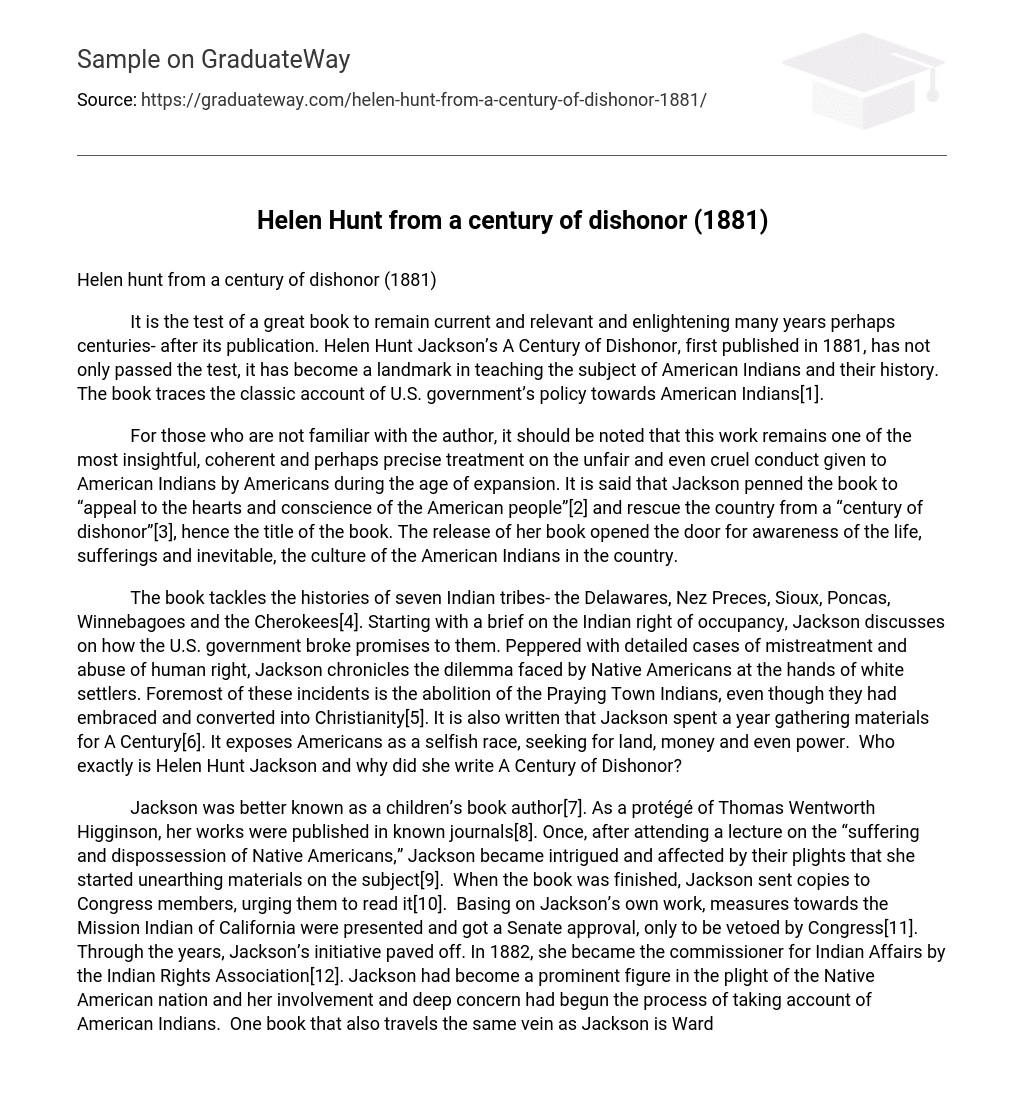It is the test of a great book to remain current and relevant and enlightening many years perhaps centuries- after its publication. Helen Hunt Jackson’s A Century of Dishonor, first published in 1881, has not only passed the test, it has become a landmark in teaching the subject of American Indians and their history. The book traces the classic account of U.S. government’s policy towards American Indians[1].
For those who are not familiar with the author, it should be noted that this work remains one of the most insightful, coherent and perhaps precise treatment on the unfair and even cruel conduct given to American Indians by Americans during the age of expansion. It is said that Jackson penned the book to “appeal to the hearts and conscience of the American people”[2] and rescue the country from a “century of dishonor”[3], hence the title of the book. The release of her book opened the door for awareness of the life, sufferings and inevitable, the culture of the American Indians in the country.
The book tackles the histories of seven Indian tribes- the Delawares, Nez Preces, Sioux, Poncas, Winnebagoes and the Cherokees[4]. Starting with a brief on the Indian right of occupancy, Jackson discusses on how the U.S. government broke promises to them. Peppered with detailed cases of mistreatment and abuse of human right, Jackson chronicles the dilemma faced by Native Americans at the hands of white settlers. Foremost of these incidents is the abolition of the Praying Town Indians, even though they had embraced and converted into Christianity[5]. It is also written that Jackson spent a year gathering materials for A Century[6]. It exposes Americans as a selfish race, seeking for land, money and even power. Who exactly is Helen Hunt Jackson and why did she write A Century of Dishonor?
Jackson was better known as a children’s book author[7]. As a protégé of Thomas Wentworth Higginson, her works were published in known journals[8]. Once, after attending a lecture on the “suffering and dispossession of Native Americans,” Jackson became intrigued and affected by their plights that she started unearthing materials on the subject[9]. When the book was finished, Jackson sent copies to Congress members, urging them to read it[10]. Basing on Jackson’s own work, measures towards the Mission Indian of California were presented and got a Senate approval, only to be vetoed by Congress[11]. Through the years, Jackson’s initiative paved off. In 1882, she became the commissioner for Indian Affairs by the Indian Rights Association[12]. Jackson had become a prominent figure in the plight of the Native American nation and her involvement and deep concern had begun the process of taking account of American Indians. One book that also travels the same vein as Jackson is Ward Churchill’s From a Native Sons: Selected Essays on Indigenism, 1985-1995. Collecting essays throughout the years, Churchill is able to make the message known similar to how Jackson was able to achieve. What is good about the book is that Churchill has the ability to make the reader feel the continuous anguish Indians are facing in a white society. His blunt writing helps ingrain the suffering his people are dealing with.
Reading Jackson and Churchill can serve as an eye-opener to the world of the American Indians. It is rather ironic that these people, beyond doubt part of US history, have to rely on writers like Jackson and Churchill to remind Americans that they too, are part of the American fabric of society and as such, deserve to be treated as equals.
BIBLIOGRAPHY
Jackson, Helen Hunt. “A Century of Dishonor,” Archive.org. Home page on-line.
Available from http://www.archive.org/steam/centurydis00jackrich/centurydis00jack_djvu.txt;
Internet; accessed 7 March 2009.
Enotes.com. “Nineteenth Century Criticism,” eNotes.com. Home page on-line.
Available from http://www.enotes.com/nineteenth-century-criticism/jackson-helen-hunt;
Internet; accessed , 7 March 2009.
[1] Helen Hunt Jackson, ”A Century of Dishonor,” Archive.org, http://www.archive.org/steam/centurydis00jackrich/centurydis00jack_djvu.txt, Accessed 7 March 2009.
[2] Ibid.
[3] Ibid.
[4] Ibid.
[5] Ibid.
[6] Ibid.
[7] Enotes.com, “Nineteenth Century Criticism,” eNotes.com, http://www.enotes.com/nineteenth-century-criticism/jackson-helen-hunt, Accessed 7 March 2009.
[8] Ibid.
[9] Ibid.
[10] Ibid.
[11] Ibid.
[12] Ibid.





